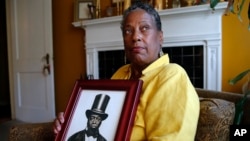Not even the threat of being sold into slavery could stop Samuel Burris, a conductor on the United States’ so-called Underground Railroad, from helping slaves to freedom in the 19th century.
A free black man, Burris was caught helping a slave try to escape in 1847 from the eastern Atlantic state of Delaware in 1847. After Burris was tried and found guilty of enticing slaves to escape, part of his sentence was that he be sold into slavery for seven years. Instead, a Pennsylvania anti-slavery society raised the money to purchase him and set him free. And Burris went right back to helping slaves escape.
Now, Delaware Governor Jack Markell has decided to posthumously pardon Burris for that long-ago conviction, according to two people who have sought that step.
Emotional reaction
Ocea Thomas of Atlanta said in a telephone interview Tuesday that she received a phone call this weekend letting her know Markell would pardon Burris, who died in the 1860s and is one of Thomas' ancestors. Phone and email messages left Tuesday for Markell's spokeswoman, Kelly Bachman, were not immediately returned.
Thomas says she became emotional after learning that Burris, the brother of her great-great-grandmother, would be pardoned.
“I stood there and cried. It was pride. It was relief – I guess justification. All of that,'' Thomas said.
Scope of assistance unclear
Robin Krawitz, a historian at Delaware State University who is writing a book about Burris, said historians don't know exactly how many slaves Burris helped escape but they do know he continued his work even after his conviction, at great personal risk.
Slaveholders and sympathizers eventually complained to the state legislature, saying Burris hadn't stopped enticing slaves to leave their masters. Burris left the state when lawmakers responded with a law that could have brought a lashing so severe it would have been tantamount to a death sentence.
Thomas, Burris' relative, says she was told the pardon will take place November 2, the anniversary of Burris' conviction. The state had already been planning to unveil a historical marker honoring Burris that day. The marker will be placed in Delaware's Kent County, near where Burris grew up.
Robert Seeley, of Havertown, Pennsylvania, who had asked the governor earlier this year to pardon Burris and two other men, confirmed that he'd also been contacted about the pardon.
“It's a victory. It brings honor to the Burris family and it brings justice for Samuel Burris and his descendants. It's making a wrong a right finally,'' Seeley said.
Other pardons sought
Seeley had asked the governor to pardon Burris as well as two others who had worked to get slaves to freedom: John Hunn and Thomas Garrett, one of Seeley's relatives who is credited with helping more than 2,000 slaves escape. Seeley says he got the idea after outgoing Illinois Governor Pat Quinn granted clemency to three abolitionists convicted for hiding and helping escaped slaves.
Seeley says that he's been working with Markell's office but that the governor can't issue a pardon in the other cases because Garrett and Hunn were tried in federal court, not state court. He says that President Barack Obama would need to pardon them – and that he plans to continue working toward that.
“Even if it comes out to be a proclamation or a declaration or not an official presidential pardon, so be it. We'll see what we can do,” he said.










